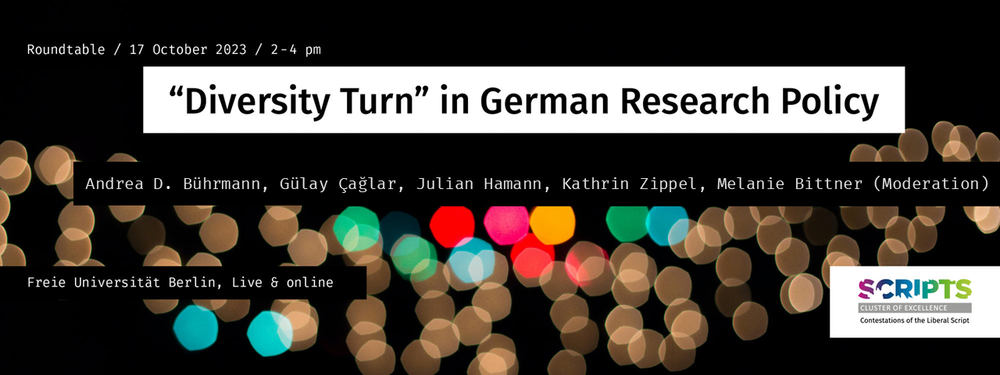SCRIPTS hosted the roundtable "Diversity Turn in German Research Policy" on October 17 from 14-16h.
Panelists were Andrea Bührmann (Director of the Göttinger Institut für Diversitätsforschung), Gülay Çağlar (SCRIPTS & FU Berlin), Julian Hamann (HU Berlin) and Kathrin Zippel (SCRIPTS & FU Berlin). The Roundtable was moderated by Melanie Bittner (Consultant for Gender & Diversity).
Programme
“Diversity” seems to be the new rising paradigm within German research policies. Working in tandem with the already well diffused but equally ambiguous principle of “excellence”, diversity is seen as a means of ensuring international competitiveness in academic research. However, the establishment of Diversity Offices and “research-oriented equity and diversity standards” by the Deutsche Forschungsgemeinschaft (DFG) has been met with controversy in the academic community.
The critiques of the diversity turn focus on alleged anti-merit-based diversity policies that supposedly counteract aspirations for excellence. Proponents of the diversity turn, however, examine the seeming meritocracy of the university critically and propose a more inclusive notion of excellence. Another hot topic of this debate is if diversity measures cause restrictions of academic freedom. In this heated exchange on principles, the scientific evidence behind the justification for diversity is often overlooked if not strategically disregarded.
Our roundtable aimed to address these controversial issues by choosing the format of a cluster of excellence as a case study and exploring the following questions: how can diversity be realized within such a cluster? How do clusters of excellence balance diversity, excellence, and merit? How and where can lessons learned from comparable international contexts be applied to this format? If clusters serve as places for innovation for German academia, how can their knowledge be transferred to universities and scaled up to the system as a whole? The roundtable provided a platform for a nuanced discussion on the challenges and opportunities presented by the "diversity turn" in German research policy and its implications for academic excellence and inclusion.
Speakers
Prof. Dr. Andrea D. Bührmann is a sociologist at the Faculty of Social Sciences, University of Göttingen. She is founding director of the Göttingen Diversity Research Institute. Her work focuses on gender and diversity studies, the sociology of work and economics, and qualitative methodologies of social research.
Prof. Dr. Gülay Çağlar is political scientist at the Otto-Suhr Institute for Political Science, Freie Universität Berlin. Gülay Çağlar is director of the research unit Gender & Diversity as well as board member of the Margarita von Brentano Center. Çağlar’s work focuses on gender studies and feminist theories, nutritional policies, global governance, and political resistance.
Prof. Dr. Julian Hamann is sociologist at the Department of Education Studies, Humboldt-University Berlin. His work focuses on higher education research, with ongoing projects on, for example, academic socialization at the postdoc stage, and evaluation and social inequality in academia.
Prof. Kathrin Zippel, PhD is sociologist at the Department of Political and Social Sciences, Freie Universität Berlin. Kathrin Zippel is Einstein Strategic Professor for sociology with focus on gender studies. Zippel’s research is focused on gender equality and diversity measures as well as on gender aspects of global change processes in science and education.
Melanie Bittner (Moderation) has been a freelance consultant for gender, diversity, and anti-discrimination culture since 2011. With a degree in educational science and gender studies, she served as a staff member at Freie Universität Berlin in the Gender and Diversity in Academic Teaching Toolbox. In 2022, she co-founded the platform of of gender*sternchen offering support to gender equality actors.
About the event
- Registration: All welcome, we kindly asked for registration in advance
- Directions: The seminar room 2.2051 is located on level 2 of the Holzlaube, Freie Universität Berlin. Access the Holzlaube through the entrance at Fabeckstr. 23-25, 14195 Berlin. 7 min walk from U Dahlem Dorf (U3, Bus X83, M11). The building is equipped with elevators. Route calculation (VBB) ↗
Time & Location
Oct 17, 2023 | 02:00 PM - 04:00 PM
Freie Universität Berlin
Seminar Room 2.2051 (Level 2)
Holzlaube
Fabeckstr. 23-25, 14195 Berlin

